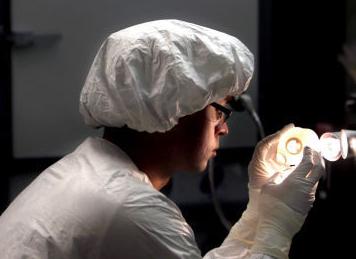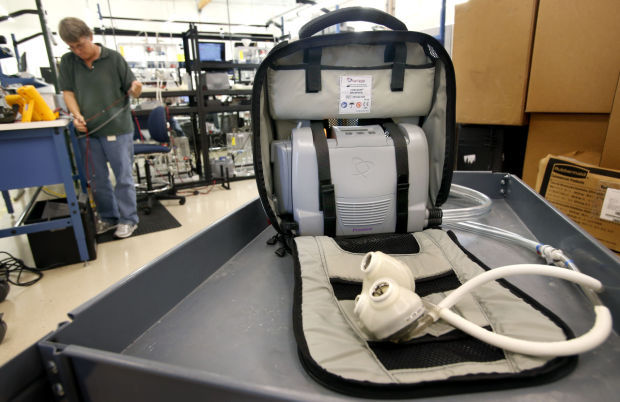Tucson-based artificial-heart maker SynCardia Systems Inc. isn’t saying why it called off its planned initial public offering of stock recently.
But experts say a generally tough market for health-care IPOs, and a product recall completed a month before the issue was priced, likely had much to do with SynCardia’s decision.
SynCardia, maker of the only temporary artificial heart approved in the U.S. as a bridge to transplant, withdrew its $30 million initial public offering of stock in an Oct. 13 filing with the U.S. Securities and Exchange Commission.
The company gave no reason for withdrawing the offering, saying only that “it does not intend to pursue the contemplated public offering at this time.” Such requests are considered granted unless the SEC objects within 15 days.
SynCardia spokesman Don Isaacs said the company isn’t commenting on the IPO withdrawal at this time.
SynCardia’s retrenchment wasn’t altogether surprising, as several health-care companies have recently balked at IPOs amid a tough climate for new issues, an expert on public offerings said.
“The most common reason for withdrawals is poor market conditions and that is what we have now,” said Kathleen Smith of Renaissance Capital, a Greenwich, Connecticut-based research firm that closely tracks IPOs and manages IPO-focused investment.
The number of IPO pricings — when a company sets its initial share price — are 35 percent below last year and issuance has been very slow since September, said Smith, manager of IPO-focused exchange-traded funds for Renaissance Capital.
“IPO investors are valuation sensitive and are requiring issuers to slash their prices,” Smith said.
Since Sept. 1, IPOs have been priced on average at 17 percent below the mid-point of their ranges, and returns on IPOs done in 2015 are negative, Smith noted.
As a result, Smith said, the number of IPOs postponed or withdrawn is up 26 percent, including since Sept. 1 withdrawals by SynCardia, Los Angeles-baed epilepsy therapy company NeuroSigma Inc. and Boston-area biotech drug developer rEVO Biologics Inc., and a postponement by Irish breast-implant provider GC Aesthetics.
Another reason may be an unfortunately timed recall of a pump used to operate SynCardia’s Total Artificial Heart.
In August, the company said it notified regulators and issued a voluntary recall of its Freedom driver after a patient briefly lost consciousness when his primary unit alarmed and it stopped pumping, quickly coming to when his caregiver switched to his backup driver. The U.S. Food and Drug Adminstration issued a Class I recall notice, meaning the driver issue could cause serious health problems or death.
No permanent injury was reported, and all affected units were quickly replaced, SynCardia said, blaming the problem on an unauthorized rework of a driver part by a supplier.
Smith said market conditions, combined with the recall, are the likely reasons SynCardia backed off from the IPO.
Varun Saxena, who has followed SynCardia as news editor for the industry journal FierceMedicalDevices, said it’s unclear whether market conditions or the recall were the primary reason for the company’s IPO withdrawal.
“Recalls for risky devices like this one are not that uncommon, and the alternative to using it would be death by heart failure,” Saxena said in an e-mail.
He cited Carmat, a French company developing an electrically powered total artificial heart. Trading in the company’s European stock was suspended briefly following the death of a second patient in May, after nine months with a Carmat heart device.
And Thoratec, a major maker of FDA-approved ventricular-assist devices — which compete to some extent with SynCardia’s heart — was the subject of Class I recalls in 2012 and 2014 for problems with its HeartMate II assist device and pump.
While acquisition by a larger company is a possibility for SynCardia, Saxena said that most of the merger and buyout talk surrounds makers of left ventricular-assist devices, or LVADs.
He noted that Thoratec was acquired by St. Jude Medical in a $3.4 billion deal finalized earlier this month, and that rival LVAD maker HeartWare has been the subject of merger rumors.
There’s no doubt SynCardia needs an infusion of capital — and soon.
SynCardia reported a net loss of $19.6 million on $8.7 million in revenues in the first six months of this year, after losing $23 million on revenues of $15.4 million in all of 2014.
In its IPO registration, the company said it has never reached profitability and the company’s accumulated deficit — a measure of cumulative net losses and negative retained earnings — was $137.3 million as of June 30.
SynCardia also noted that reports from its independent auditor over the past two years “expressed substantial doubt about our ability to continue as a going concern due to our recurring losses from operations and the need to raise additional capital.”
In its IPO filing, SynCardia said it expected to raise up to $30 million by issuing 2.5 million shares of common stock at an initial offering price of $10 to $12 per share, minus an expected $2.1 million in expenses. The offering’s underwriting investment banks, led by Roth Capital, were to have the option to buy 375,000 additional shares for proceeds of $4.5 million.
In its withdrawal request, SynCardia said it reserved the right to undertake one or more subsequent private offerings as allowed by law. Under SEC rules, a company that withdraws an IPO must wait 30 days before filing for a separate private offering of stock.
The FDA approved SynCardia’s artificial heart as a bridge to transplant in 2004, and more than 1,475 of the devices have been implanted worldwide. Last year, the FDA approved a small pneumatic driver for the heart that greatly increases patient mobility.
The company is working to win FDA approval of the use of its heart as “destination” therapy for patients who aren’t candidates for transplant and is developing a downsized heart to fit smaller patients, including women and youths.






